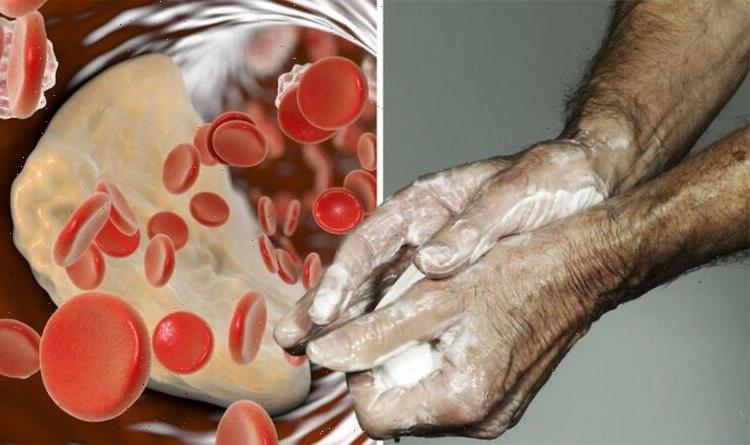High cholesterol: Nutritionist reveals top prevention tips
We use your sign-up to provide content in ways you’ve consented to and to improve our understanding of you. This may include adverts from us and 3rd parties based on our understanding. You can unsubscribe at any time. More info
High cholesterol is a fatty molecule that is widely associated with dietary saturated fat. It is often present in plaque, which builds on the arterial walls in a progressive fashion. In the advanced stages, treatment is crucial to avoid further complications like heart attack and stroke. One warning sign of clogging may be apparent when washing your hands under hot and cold water.
The longer high cholesterol is left unmanaged, the bigger the consequences for one’s health.
This is because cholesterol deposits circulating in the blood cling to the inner walls of the arteries, causing them to harden over time.
This hardening of the arteries, also known as atherosclerosis, can give rise to a host of complications throughout the body.
According to the Mayo Clinic: “Atherosclerosis is the build-up of fats, cholesterol and other substances in and on your artery walls. This buildup is called plaque.
READ MORE: High cholesterol diet: Doctor shares two ‘most effective’ foods for lowering cholesterol

“The plaque can cause your arteries to narrow, blocking blood flow. The plaque can also burst, leading to a blood clot.
“Although atherosclerosis is often considered a heart problem, it can affect arteries anywhere in your body.”
Depending on which arteries are affected, symptoms will manifest differently.
The health body continues: “When atherosclerosis narrows the arteries in your arms or legs, you may develop circulation problems in your arms and legs called peripheral artery disease.
“This can make you less sensitive to heat and cold, increase your risk of burn of frostbite.
“In rare cases, poor circulation in your arms or legs can cause tissue death.”
Numbness and coldness in the body’s extremities are also common signs of atherosclerosis.
How to avoid high cholesterol
Statins has become the mainstay of cholesterol treatment, but in the initial stages, diet is massively helpful.

The UK Government’s scientific advisory committee on nutrition has previously cited dairy food and meat as substantial contributors to non-HDL cholesterol.
Other foods to avoid include eggs, coconut oil, palm oil, butter or lard, according to the NHS.
Foods that contain soluble fibre and plant sterols, on the other hand, should be emphasised in your diet.

Soluble fibre helps rid the body of harmful cholesterol by latching to the molecules inside the digestive tract and dragging them our the body.
Plant sterols are able to block cholesterol by racing against it for absorption.
Other beneficial foods include oat, which prevents cholesterol molecules from being reabsorbed by the gut.
Keeping your cholesterol levels in check is essential, as this broadens the opportunity to lower levels through a healthier diet and taking statins.
Source: Read Full Article
